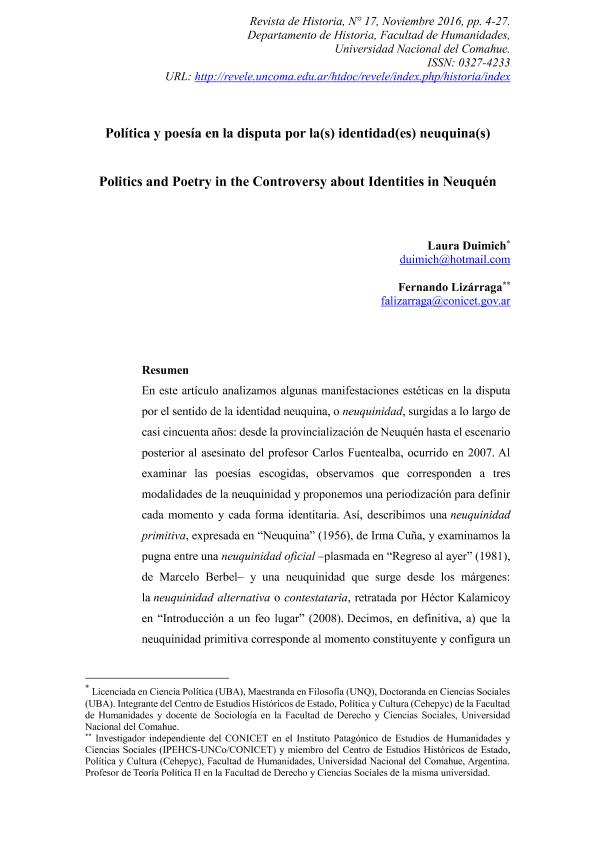Mostrar el registro sencillo del ítem
dc.contributor.author
Duimich, Laura Fernanda

dc.contributor.author
Lizárraga, Fernando Alberto

dc.date.available
2018-11-27T20:20:43Z
dc.date.issued
2016-11
dc.identifier.citation
Duimich, Laura Fernanda; Lizárraga, Fernando Alberto; Política y poesía en la disputa por la(s) identidad(es) neuquina(s); Universidad Nacional del Comahue. Facultad de Humanidades. Departamento de Historia; Revista de Historia ; 17; 11-2016; 4-27
dc.identifier.issn
0327-4233
dc.identifier.uri
http://hdl.handle.net/11336/65384
dc.description.abstract
En este artículo analizamos algunas manifestaciones estéticas en la disputa por el sentido de la identidad neuquina, o neuquinidad, surgidas a lo largo de casi cincuenta años: desde la provincialización de Neuquén hasta el escenario posterior al asesinato del profesor Carlos Fuentealba, ocurrido en 2007. Al examinar las poesías escogidas, observamos que corresponden a tres modalidades de la neuquinidad y proponemos una periodización para definir cada momento y cada forma identitaria. Así, describimos una neuquinidadprimitiva, expresada en ?Neuquina? (1956), de Irma Cuña, y examinamos la pugna entre una neuquinidad oficial ?plasmada en ?Regreso al ayer? (1981), de Marcelo Berbel? y una neuquinidad que surge desde los márgenes: la neuquinidad alternativa o contestataria, retratada por Héctor Kalamicoy en ?Introducción a un feo lugar? (2008). Decimos, en definitiva, a) que la neuquinidad primitiva corresponde al momento constituyente y configura un enclave utópico de armonía social; b) que la neuquinidad oficial, gestada desde el Estado, ya sea bajo gobiernos dictatoriales o del Movimiento Popular Neuquino, expresa una identidad reaccionaria, articulada en la lucha contra el enemigo no-neuquino; y c) que la neuquinidad contestataria, ligada a una ?contra-cultura de la protesta?, representa una posición de clase y se manifiesta como horizonte antisistémico.
dc.description.abstract
In this article we analyze some aesthetic expressions concerning the dispute over the forms of identity in Neuquén province (“neuquinidad”), which were produced at different times throughout fifty years: from the moment Neuquén became a province to the aftermath of the assassination of Carlos Fuentealba, in 2007. By reading selected poems, we find that they correspond to three modes of “neuquinidad” and we develop a timeline to define each context and each identity form. Thus, we describe a primitive neuquinidad, as it is expressed in a poem of 1956, and we look into the tensions between an official neuquinidad –penned in a song– and an identity that emerges from the margins: the alternative or rebellious neuquinidad. In short, we hold: a) that the primitive neuquinidad is related to the moment when the provincial constitution is being drafted as an utopian enclave of social harmony; b) that the official neuquinidad, grown from within the State, be it during times of dictatorships or under constitutional administrations, embodies a reactionary identity, forged in the struggles against outsiders; and c) that the rebellious or alternative neuquinidad, linked to a counter-culture of protest, assumes a class position and manifests itself as an anti-systemic horizon.
dc.format
application/pdf
dc.language.iso
spa
dc.publisher
Universidad Nacional del Comahue. Facultad de Humanidades. Departamento de Historia
dc.rights
info:eu-repo/semantics/openAccess
dc.rights.uri
https://creativecommons.org/licenses/by-nc-sa/2.5/ar/
dc.subject
Neuquén
dc.subject
Identidades
dc.subject
Política
dc.subject
Poesía
dc.subject.classification
Ciencia Política

dc.subject.classification
Ciencia Política

dc.subject.classification
CIENCIAS SOCIALES

dc.title
Política y poesía en la disputa por la(s) identidad(es) neuquina(s)
dc.title
Politics and Poetry in the Controversy about Identities in Neuquén
dc.type
info:eu-repo/semantics/article
dc.type
info:ar-repo/semantics/artículo
dc.type
info:eu-repo/semantics/publishedVersion
dc.date.updated
2018-10-23T13:45:31Z
dc.journal.number
17
dc.journal.pagination
4-27
dc.journal.pais
Argentina

dc.journal.ciudad
Neuquén
dc.description.fil
Fil: Duimich, Laura Fernanda. Universidad Nacional del Comahue. Facultad de Humanidades. Centro de Estudios Históricos de Estado, Politica y Cultura; Argentina. Consejo Nacional de Investigaciones Científicas y Técnicas; Argentina
dc.description.fil
Fil: Lizárraga, Fernando Alberto. Universidad Nacional del Comahue. Instituto Patagónico de Estudios de Humanidades y Ciencias Sociales. Consejo Nacional de Investigaciones Científicas y Técnicas. Centro Científico Tecnológico Conicet - Patagonia Norte. Instituto Patagónico de Estudios de Humanidades y Ciencias Sociales.; Argentina
dc.journal.title
Revista de Historia
dc.relation.alternativeid
info:eu-repo/semantics/altIdentifier/url/http://revele.uncoma.edu.ar/htdoc/revele/index.php/historia/article/view/1330/pdf
Archivos asociados
